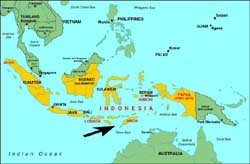 EAST TIMOR: Foreign Minister, Jose Ramos Horta, conceded intervention is needed to restore order after police defections and assaults by rebel troops yesterday, including on the home of the military chief, Brigadier-General Taur Matan Ruak.
EAST TIMOR: Foreign Minister, Jose Ramos Horta, conceded intervention is needed to restore order after police defections and assaults by rebel troops yesterday, including on the home of the military chief, Brigadier-General Taur Matan Ruak.Australia received a formal request for military assistance from Dili last night and the acting Prime Minister, Peter Costello, said cabinet's national security committee was disposed towards sending troops, subject to appropriate conditions being agreed between the two governments.
Portugal, the former colonial ruler, said yesterday it would send 120 military police, while New Zealand and Malaysia were also invited, Ramos Horta said.
He said Australia would join East Timor and the other nations to call for an emergency meeting of the United Nations Security Council to endorse the operation.
East Timor's President, Xanana Gusmao, and Prime Minister, Mari Alkatiri, called for an international force during a meeting with the United Nations, the Australian ambassador and others. SMH Australians will lead East Timor intervention
I have been a critic of military intervention, and still have reservations. However, my main issue has been the gung ho attitude of the Australian government in the region; an attitude more likely to increase tensions rather than subdue.
At the heart of the matter is self determination – allowing identifiable and geographically defined cultures to choose the path of their own future.
East Timor was necessarily born out of a long, violent struggle against oppressive and unwanted Indonesian rule. Near neighbor, West Papua is currently undergoing the very same struggle to loose the bonds of the regional monster.
The problem for East Timor is what do you do with a generation of freedom fighters who endured years of dislocation and hardship to win independence? How do you simply integrate them into the peaceful process of building a brand new, peaceful country?
Not with the help of the US, the UN and Australia, that is obvious. The East Timorese leaders did not want a military force, did not need one. A well trained, disciplined police force was ample for their needs.
The tiny country could never effectively defend itself against an invasion, so a army, by default, becomes a policing arm or just plain restless. Using any military force for civil control is fraught with dangers all too well known.
But the powers, perhaps seeing the advantage of harnessing these former freedom fighters for their own benefit manipulated the country into establishing their army, the one which has now turned around and reverted to jungle rebels.
East Timor was never going to have an easy road to achieving their goal of stable self government. Meddling by the big powers has made the task even harder.
UPDATE:
Keeping up the proud tradition of regional policeman:

No comments:
Post a Comment